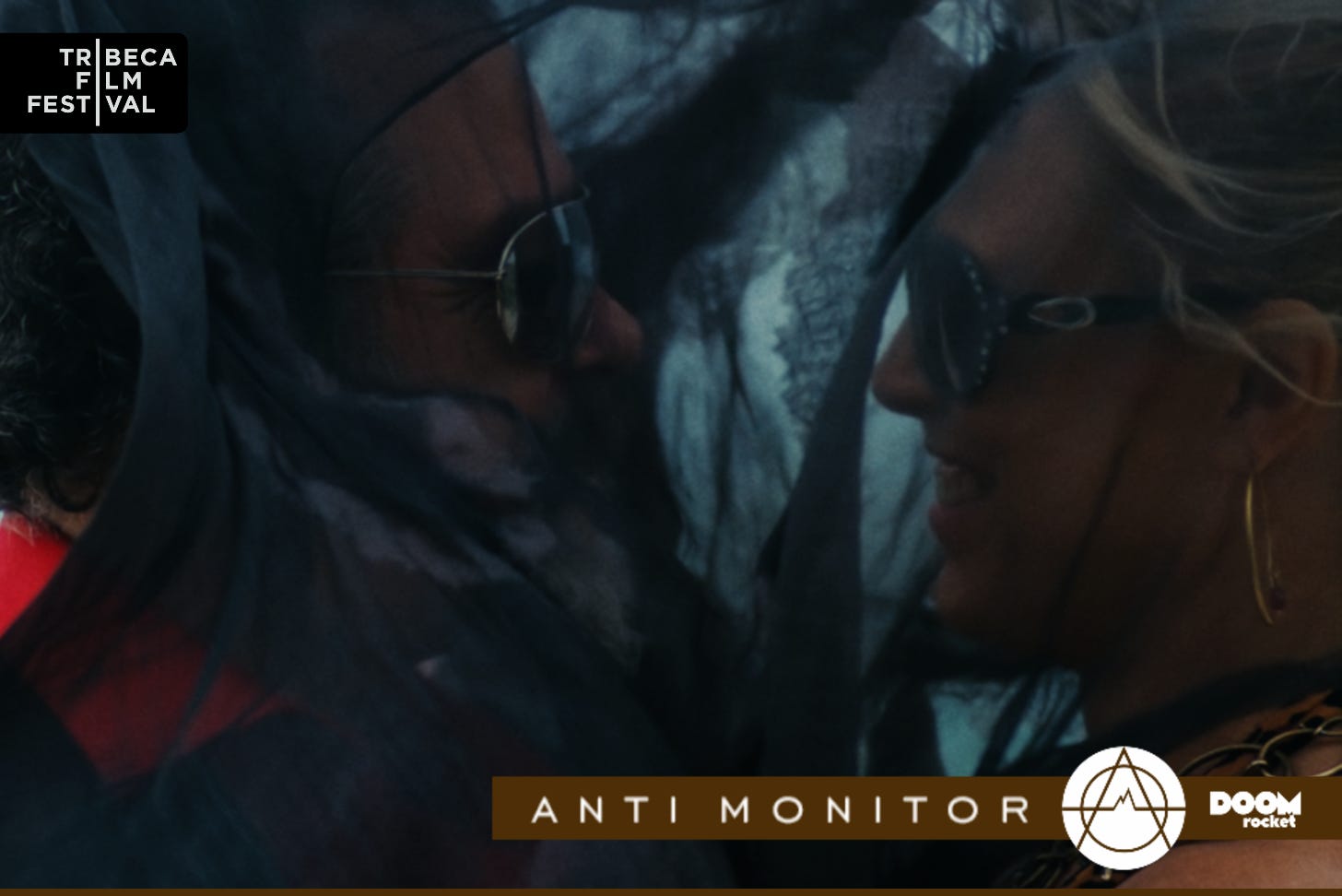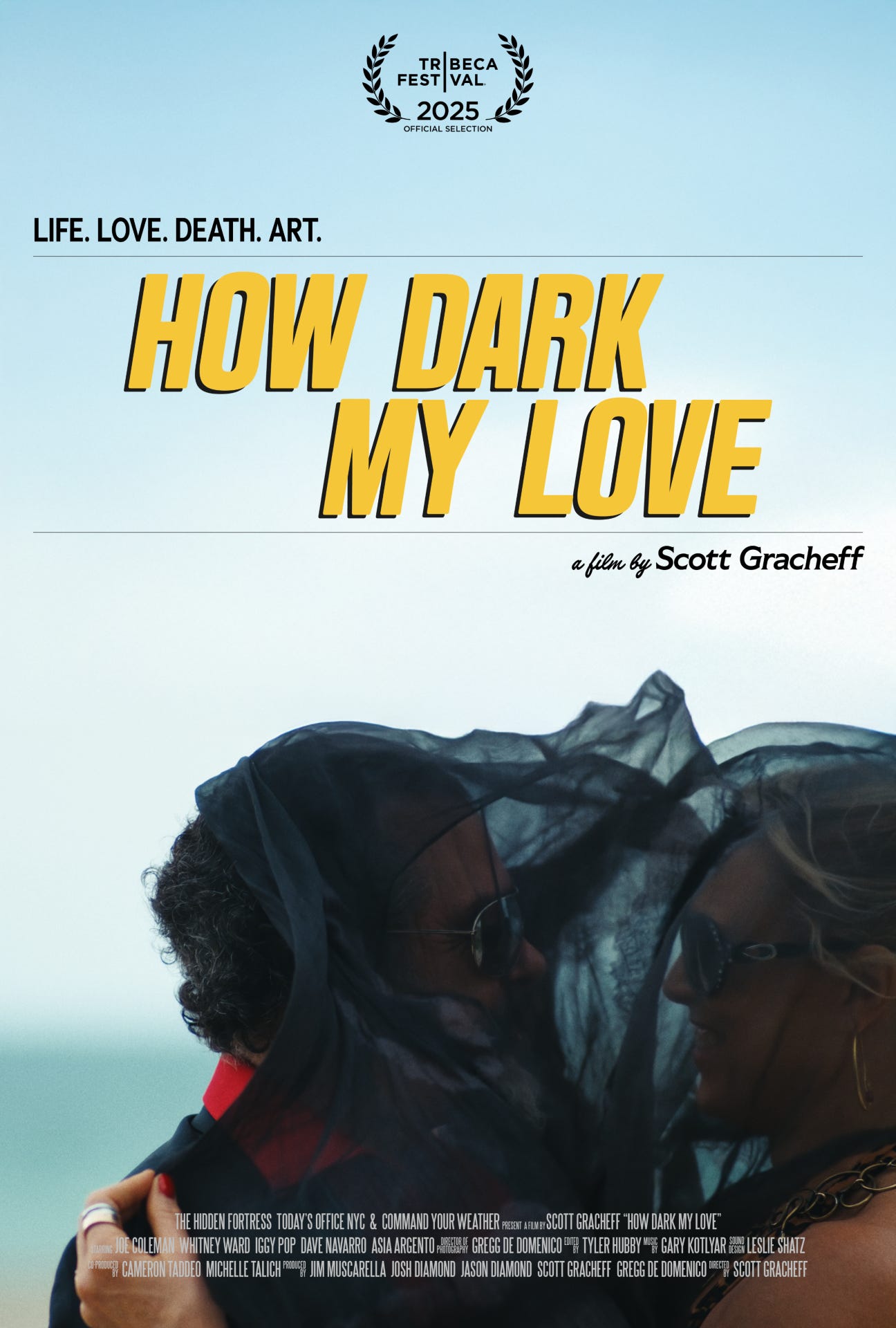How Dark My Love Review: Two hearts burning as one
Scott Gracheff's documentary is a ruminative, raw-nerve valentine.
The painter Joe Coleman is famous (or infamous) for his collisions of the tragic, vicious, grotesque, and divine, his ornate and startling work occupying that volatile space where the sacred collides with the profane. How Dark My Love, Scott Gracheff's tender and absorbing documentary, doesn't so much profile Coleman as it basks in his brilliance, capturing his compulsions, his craft, and, crucially, his ecstatic devotion to Whitney Ward: dominatrix, photographer, muse, and wife. His film grants us, with remarkable generosity, a guest pass into Coleman's Odditorium, a singular space of sinister artifacts, horror-fetish bric-a-brac, infant cadavers in jars, and at its flaming center, the most recent example of Coleman's devotion: "Doorway to Whitney."
"When I think of the enormity of it, I feel obviously really honored, and kind of overwhelmed by it," Whitney says. Her words, tinged with humility, only hint at the weight of her husband's latest opus. For those familiar with his oeuvre — his nervy, hyper-detailed portraits of scoundrels, serial killers, and guitar-totin' outlaws — it's understood that his pieces go far beyond merely tinkering with likeness. They encapsulate a lifetime through a dense mosaic of micro-art biography and symbolic filigree, collapsing the sum of a person into something disturbing and psychically revealing. So when, in the process of rendering Whitney's past abuse on the canvas, he decides to repaint the scene because it is "not ugly enough," he is asserting that beauty comes from truth; for this portrait to be truthful, it must be allowed to be ugly.
Coleman's equally revealing self-portrait, "Doorway to Joe" (2017), lends his portrait of Whitney a sense of vulnerable symmetry. It's her turn to be exposed, not in some superficial gesture of fairness, but because their lives, their archive of shared absurdity and passion, have dictated a wild cosmic imperative for her story to be told through his hand. And Coleman, ever the provocateur, puts all of her up there: her resolve, her quirks, the mother she lost (and the way she was taken), the mythic tenderness of their shared years. All of it is part of a diptych, meant to be one, yet always apart. That's the wrinkle: art is a business, and his five-year stretch of work on "Joe" and "Whitney" puts the couple in debt, giving the film a faint but no less urgent dramatic constriction. Her life — their lives — are for sale. The painting may end up in a gallery or the limbo of a private collection; either way, exposure is inevitable, and it won't belong to her.
Coleman's larger pursuit as an artist — and maybe this is the reason his work holds such perverse magnetism — is that he seeks out the soul in the detritus, stitching together a riotous patchwork of anecdotes, obscenities, and visual static to reveal some untold humanity on the canvas. His subjects stand there, Clowesian Eightball figures simmering with lysergic fury, as the artist attempts to summarize the unquantifiable, to make sense of the monsters and maestros who make the largest waves in this chaotic sea of ours.
Gracheff creates a patchwork of his own. His documentary is less a portrait than a parallel construction, a tribute and a thank you, a film with a center that initially spirals out to explore Joe's life as an addict, aimless taxi driver, self-detonating performance artist, and reluctant legend among the counterculture. The arrival of figures like Asia Argento (who cast Coleman in her 1998 film Scarlet Diva), Dave Navarro, and Iggy Pop — weathered and learned devotees who share and appreciate Coleman's ambition — doesn't serve as a battery of celebrities crowbarred into the film to enhance its profile. Instead, it illustrates how Coleman's work has altered the creatively addled, a pillar of the zeitgeist. Pop's comment on owning Coleman's portrait of the killer Carl Panzram — "It's just nice to have him around" — aside from being funny, reveals their shared hunger for the dark and strange. To hang a Joe Coleman painting is to be a fellow traveler.
Whitney and Joe's love is the lifeblood of How Dark My Love, and it runs like a torrent through the film. In keeping with truth, Gracheff is attuned to their divergences. One cutting moment sees a gallery owner inquiring about an impaled goldfish in the portrait — a fetishistic artifact from her dominatrix days — and Whitney, blindsided, becomes visibly annoyed. Gracheff smartly precedes this with a revealing story from Whitney concerning a New Yorker profile that drew too much light onto her professional life, suggesting that the visibility Joe offers her now is both a gift and, perhaps, a violation. Whitney comes off as a person with a huge heart whose work is people: capturing them, sharing them, and pushing them to exhilarating places. The acknowledgment, the appreciation, is ephemeral, which hangs the permanence of Joe's portrait in a harsher light. "It has to be challenging for you," Joe says. Whitney: "Well, you fucking nailed it."
Gracheff cruises past a tight 90 minutes for a coda that lingers, appropriately, on the fate of "Doorway to Whitney," rendering the removal of the piece from Joe's studio with an almost cold sterility. "It feels like burglars have been through here," he says afterward. The painting's absence affects them both: Whitney remarks that it's like sending a child into the world, a bittersweet culmination of a difficult and ever-evolving process. For him, it means having "Joe" and "Whitney" briefly hung together in a prominent gallery; for her, it's saying goodbye. The worst is that the portrait is put in storage. In offering her life so fully, Whitney risks seeing it entombed.
I'll save the ultimate fate of "Doorway to Whitney" for you to discover.
How Dark My Love is, in the end, a chronicle of growth — artistic, spiritual, romantic — and of its toll. It charts with startling intimacy the blossoming of a vision and its inevitable surrender. Pain, ecstasy, obsession, frustration, torment, love, passion — each brushstroke a tribute to a rich and perilous life. By capturing it, Gracheff crafts a ruminative, raw-nerve valentine that bleeds onto the screen, showcasing the brutal and beautiful extremes of devotion, and opening a window into a world that people will feel compelled to view — whether with interest, admiration, disgust, or dismissal — that is then gently closed. And rightfully so. When all your life's been hung on a wall, there's nothing else that needs to be shared. Gracheff leaves these two in peace. And light.
9 / 10
How Dark My Love premiered at the Village East at Angelika on Saturday, June 7. For more info, click this.
Written and directed by Scott Gracheff.
109 mins. / Unrated. This features GG Allin footage, let me put it like that.



